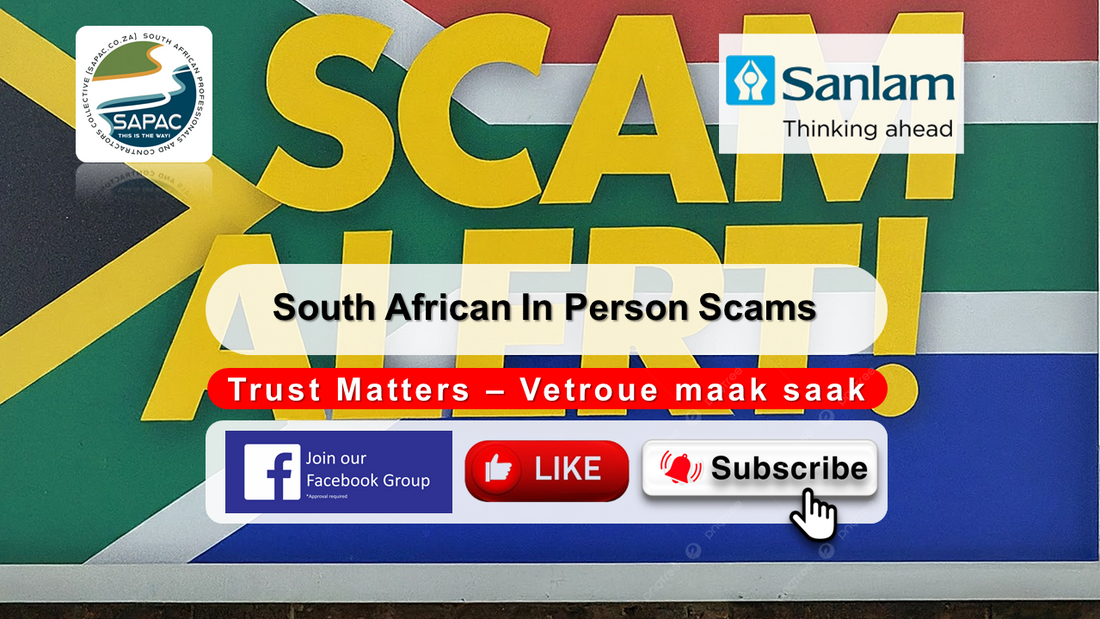
South African In-person scams
SAPAC ReporterShare
South African In-person scams
Prepared by : Independent
Article Classification: Ways Scammers reach You
Image courtesy: SAPAC Professionals and Contractors
Get in contact with SAPAC:![]() Besoek | Visit https://sapac.co.za/
Besoek | Visit https://sapac.co.za/
📑 Complete Form: Link (PRESS HERE) FOR SAPAC
[GOEIE INFORMASIE] SLUIT AAN! https://bit.ly/JoinSAPAC
Areas: Southern Africa, Northern Cape, Western Cape, Cape Winelands, Free State, Gauteng, North West Province, Limpopo, Mpumalanga, Natal
South African In-person Scams
Some scams take place in person.
Scammers may knock on your door or approach you in public and ask you to do something. They might:
- ask for upfront payment for goods and services
- pressure you into completing a survey to get your personal details
- ask for donations to a ‘charity’.
- Impersonate official municipal or governmental workers i.e. electrical department or waste water workers completely kitted with coveralls and hard hats.
Warning signs it might be a scam
Stop and think.
Does the person
- request payment via unsecure methods such as cash or gift cards?
- refuse to provide receipts for goods, services, or charitable donations?
If so, watch out – it sounds like a scam.
Scammers use common scam tactics to coerce you, such as:
- asking you to take immediate action
- offering items for sale at significantly lower prices than usual or compared to other sites
- telling you about a way to make quick, easy money with little risk or effort.
- telling you they are there on official business for a municipality or other utility department.
Steps you can take to protect yourself
These simple steps can help prevent loss of money or personal information to scams.
- Do not use the phone number or contact details listed on the letter – if you want to follow up to check if the letter is real by contacting the person or organization directly. Always use contact details you’ve found yourself such as in the phone book or by looking up the organization's website.
- Speak to someone you trust like a friend or family member before acting.
- Do not pay money in order to receive a ‘prize’.
- Call your home owners association, next door neighbor or the municipality to find if any notifications has been made
These simple steps can help prevent loss of money or personal information to scams.
- If someone calls and knocks on your security gate or door and you don’t know who they are, you don’t have to open your security or door.
- Ask to see identification of anyone claiming to be a charity worker, government, or law enforcement official. Call the organization on a number you found yourself to check their credentials if unsure. (Always check)
- Never give upfront payment to a door-to-door salesperson, especially if they ask for cash only.
- Check a charity is registered on the CharitySA website there is a list of charity originations
- If an offer appears too good to be true it probably is. Research any investment opportunity fully before investing money. Rather speak to a registered FAIS Broker or your Insurance underwriter.
- At any time, say no and ask the person to leave if you’re unsure or feel uncomfortable. Ensure at all times that you are either in a public setting. Or that when at home or the office there is a structural barrier in place.
- Only act on pre-arranged appointments.
Common South African website scams

|
South African Service delivery and product scamsScammers prey on consumers and businesses that are selling or buying products and or services. Not every transaction is legitimate |
|
|
South African Impersonation scamsIdentity theft is on the rise and is a type of fraud that involves using someone else`s identity to gain benefits or to steal money |
South Africa Current Time (SAPAC Time) - 24 Hour Format
South African Professionals and Contractors (SAPAC) Time


